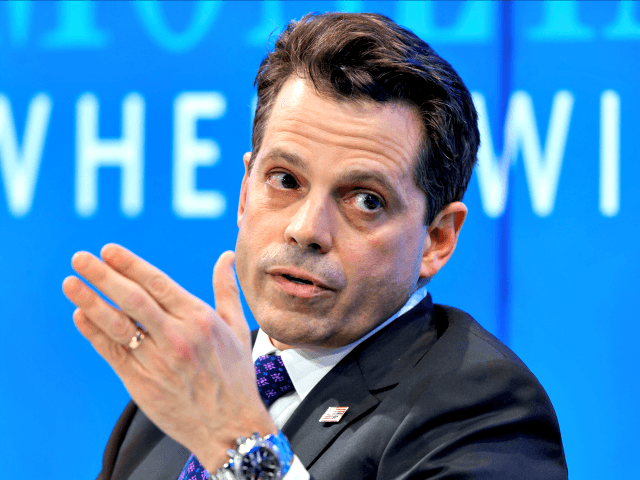President-Elect Donald J. Trump’s advisor Anthony Scaramucci told an audience at the exclusive conclave in Davos that Trump is speaking to people in the U.S. and Europe who “are feeling a common struggle” that the elites don’t understand, and warned European Union (EU) bureaucrats “to pay much closer attention to working class families”.
Speaking in the Swiss town of Davos, where annually the world’s top political, academic, financial, and media figures gather, Mr. Scaramucci addressed an audience of the elite and affirmed “[Trump is ] an effective communicator. He’s not necessarily communicating in a way that people in this community [Davos attendees] would love.
“But he is communicating very effectively to a very large group of the population of Europe and the United States that are feeling a common struggle right now that maybe many of us in this room do not feel,” said Mr. Scaramucci, who after Friday’s inauguration will be the president’s assistant and director of public liaison.
– Globalisation and American Class Mobility –
The American financier and entrepreneur drew on his personal experiences growing up, describing the “classic American middle class story” of aspiration and class mobility, his father a blue collar worker who graduated to a desk job and his mother keeping the house on a tight budget.
Outlining an exercise where he projected his father’s 1975 salary forty years later, he found it would be approximately 45 per cent down in real terms, citing the effects of globalisation and its effects on American class mobility.
“Globalisation, large labour supply, excess factory capacity, have put a strain on working class families,” said Mr. Scaramucci.
“In the 1970s working class families were quite aspirational. My dad would yell out, ‘Do your school work, go to a good college and you’ll rise in class’. I think it’s way more difficult today in those families to have those same kinds of conversations.
“If you look at the data, it’s harder to move. There’s harder class mobility.”
– Trump ‘Gets It’ –
Addressing his initial scepticism of Trump during the campaign, Scaramucci accompanied the then-candidate to a rally. Leaving the secured area to talk to people in the crowd, he told panel host Philipp Rösler at the World Economic Forum (WEF) what it was the people got about Trump that he didn’t.
“There was a common thread in that story… It was, ‘There was a factory here that closed down four years ago’, ‘I’m on some level of governmental dependency’, ‘I’m super-worried about my children’, ‘[Trump’s] here, he’s promised to come up with solutions to get jobs back in my neighbourhood.”
Reflecting that in the years following his success where he had “isolated” himself from his background, he told the audience, “I started going through the crowd and then I realised ‘Oh my God, these were the people I grew up with’.”
“[Trump] got it and I didn’t. The great irony of this story is that a billionaire real estate developer living in a tower in New York City was in closer touch with the people I grew up with than I was.
“That was when I become convinced, philosophically, that he was going to win.”
– European Union Bureaucrats –
When Rösler, the former vice chancellor of Germany, addressed the alleged “worrying” comments President-Elect Trump had made about the European Union (EU) which were interpreted as a call for the dissolution of the bloc, Scaramucci hit back.
“I don’t hear that [Trump called for the breakup of the EU]. What I heard was that he said in his political sense [the British will] vote for a Brexit.”
“Why? Because when centralised bureaucracies lose touch with the common struggle there’s a disruption.”
He added: “I think the European leadership and the European elites, the bureaucrats, had better pay much closer attention to the working class families and the middle class.
“Because the Trump administration is going to do that. That’s going to be one of my principle focuses.
“If you do that, you will close the income divide, people will feel better about themselves. If you do that, there’s a labourer who, like my dad, starts thinking aspirationally about their children the way my father was thinking about me and my brother and sister.”
Watch the interview here

COMMENTS
Please let us know if you're having issues with commenting.